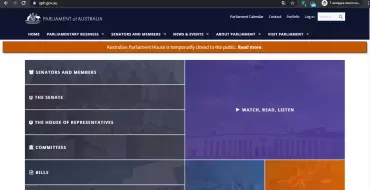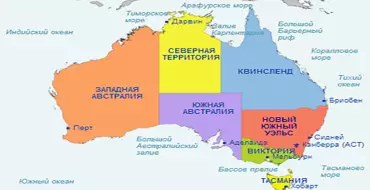
Australia

Australia is located in the southern part of the globe on the continent of the same name. It also includes several islands. Australia was under the influence of the British Empire until 1901 when several colonies were formed on the continent. Later, they remained so.
The country is now one of the most successful in terms of living standards and is among the five countries with the highest GDP per capita. In fact, the state is divided into several regions (states), each with its own legislation. This has become the "continuation of the British legacy," i.e., the early colonies are now states.
At the same time, all regions without exception are subordinate to the federal government. This is why the country is also called the Commonwealth or the Union of Australia.
Because there are different regions and legislation, the gambling industry in Australia is multifaceted.
- Each state has its own Gambling Acts and regulatory bodies (Gaming Commissions).
- Each differs in its licensing process, issuance of licenses, and list of permitted gambling.
- However, they all operate under a single gambling law in Australia, which regulates only the basic aspects and leaves regional authorities with wide discretion.
Australia: Casino with licenses
The jurisdiction is primarily used by operators offering online sports betting. This area is quite clearly defined in the legislation, unlike the organization of online casinos. Nevertheless, some of the licensed operators offer a full range of services, including sports betting and online casinos.
There are currently more than 30 companies licensed to operate online gambling.
Australia review
Australia is an attractive jurisdiction for gambling companies, first of all, due to the claim that Australians are very gambling people. And indeed, they are. Nevertheless, apart from the benefits, the country has a rather interesting gambling licensing and regulation system.
The country is divided into eight states. Each state has its own gambling laws, regulatory bodies, and tax rates, so companies can choose the most suitable conditions for them. Each region also offers certain types of licenses for different games.
Each state has a very detailed approach to developing the gambling industry. There are several taxation regimes, including some financial incentives. It is possible to negotiate with the local authorities to lower the tax rate or reduce the payment amount. And it is not extraordinary or illegal. The licensing process has also been significantly simplified. Any application can be submitted online on the official website of the Gaming Commission.
The jurisdiction pays significant attention to protecting players' rights. It is possible to file a complaint against any licensed establishment. The system for working with players who are addicted to gambling is especially careful. You can ask for help anonymously for yourself or close friends and relatives.
The jurisdiction's regulation of online gambling has two sides.
- Online casinos are banned,
- and internet sports betting and horse racing are allowed.
In December 1999, the national government made a statement about changes in gambling laws to improve the approach to gambling problems. Given this, the states and the federal government were to develop several measures aimed at the following objectives:
- Stopping further expansion of gambling in Australia.
- The impact of problem gambling on families and communities;
- Internet gambling;
- Protecting the public and players from the harms of gambling.
As early as May 2000, the government announced a moratorium on the registration of new gambling companies providing gambling services via telecommuting. In August of the same year, a bill was drafted to prohibit interactive gambling services that were not provided before May 19, 2000, for one year.
The bill passed the Senate on Dec. 6, 2000, after receiving support from several Democrats and independent senators. In March 2001, the federal government introduced legislation to prohibit Australian gambling services from providing online gambling to Australian residents.
Factually, this law is still in force today. Its main points:
- Bans gambling services from providing online gambling services to Australian residents
- Bans online gambling
- Implements a system of blocking internet resources that violate this legislation based on appeals.
Concerning land-based gambling, things are considerably simpler. They are fully legalized in the country and are available in every region. In addition to land-based casinos, you can find slot machine halls, various lotteries (Keno and Bingo), sports betting, and horse racing.
Gambling history in this country
Australia is considered to be the most gambling country. According to statistics, more than 70% of the population gambles. Australians equally prefer land-based and online casinos. Widespread betting on sports and horse racing is also a major source of income for the state, estimated to be billions of dollars. This habit of gambling has developed on the continent historically.
Since Australia was a colony of the British Empire, the first settlers in its majority were people of lower social strata with questionable moral principles, simply put, criminals. It was among them that the spirit of gambling was especially strong. As you know, the favorite game for money in the British was horse racing (horse racing). Therefore, this direction initially began to develop at a rapid pace.
In the middle of the 20th century, hippodromes appeared everywhere in the state's territory. Throughout time, the differences between social classes pushed the development of gambling. In fact, Australia saw the very rich and poor emerge. The latter played nonstop. The official date of the establishment of gambling, at least concerning horse racing, in the state is 1810.
A different kind of gambling entertainment, lottery games, appeared in 1880. They were organized by a single company, which the Australian government decided. The lottery quickly gained popularity among the locals, which later led to the legalization of this gambling activity.
The first slot machines in the country appeared virtually immediately with their invention. In about 1950, various pubs (bars) appeared where these machines stood. In principle, as in other countries, slot machines were in such demand that slot machines could be found in hotels and cafes after a few years. Currently, slot machines are also in demand among the population. You can find them in special gaming halls.
The first land-based casino appeared in Australia in about 1960 (data vary). The government immediately legalized it. The reasons are, as always, laconic—additional funds to fill the budget.
The first online casino in the country appeared in the 90s of our century. By the way, Microgaming was one of the first to distribute the games in Australia. In addition, this provider has significantly impacted the development of the country's industry.
The legalization of gambling in the country began with the opening of the first lottery and casino. Subsequently, the division of the state into several states led to the formation of several regulatory bodies.
Licensing authority
Australia Communication and Media Authority ACMA
This organization is not directly related to the regulation of gambling in Australia. If we consider regulation as performing licensing functions, collecting tax duties, and developing legislation. ACMA monitors compliance with the norms of gambling advertising on television and the Internet, and is also engaged in the fight against illegal online casino sites. The organization is responsible for compiling and maintaining a registry of licensed operators who have obtained interactive gambling licenses in the various states.
Despite the rather narrowly specialized gambling area, the Australian Communications and Media Authority accepts and deals with complaints from players. Provided that the operator is not registered in the register of online gaming providers. You can file a complaint on the official ACMA website.
Australian Capital Territory
The ACT Gambling and Racing Commission regulates gambling in the Capital State of Australia. It was established in 1999 under the Gambling and Racing Control Act.
Objectives of the commission:
- Regulate the field of gambling, including land-based and online casinos.
- Licensing
- Research of the gambling industry regarding the social impact of gambling.
- Amendments to gambling legislation
- Consulting on issues related to gambling
- Financial monitoring
- Collection of tax deductions in the gambling industry based on current legislation
Gamblers can file a complaint in case of a dispute. To do so, send an email to the Commission at. It will be necessary to describe in detail the nature of the conflict, if possible attach evidence. And provide contact details for further information.
The types of licenses issued by the Australian Capital Territory:
- Casino - license to open a land-based casino
- Employee Licenses - licenses for key employees, there are several types.
- Lotteries - license for certain types of lotteries.
- Licences gaming machine - license for slot machines.
- Licences Bookmaking online - license for organizing sports betting on the Internet.
New South Wales https://www.liquorandgaming.nsw.gov.au/
Liquor & Gaming NSW (New South Wales Liquor & Gaming Authority) was established on February 1, 2016. This Authority began to carry out most of the functions of the earlier organizations "Liquor, Gaming and Betting Authority" and "Independent Liquor & Gaming Authority (ILGA)". The Independent Liquor & Gaming Authority Board began to deal with licensing disputes, and to perform disciplinary functions.
The types of licenses issued by Liquor & Gaming NSW:
Gaming machine licence:
- gaming machine technician's licence - to carry out repairs to gaming machines.
- gaming machine seller's license - license giving the right to sell gaming machines.
- gaming machine dealer's license - license allows you to install, sell and repair slot machines.
- gaming machine testing facility license - license for testing slot machines.
Club gaming licenses - allows you to install and operate slot machines in bars and hotels.
Wagering on sports - license allowing sports betting.
Casino licenses - casino license
The regulator handles player complaints. There is a complaint form on the website. The Authority will require the player to be fairly specific about the disputed situation and not to make public statements until the end of the proceedings.
Protection of the player in terms of gambling harm is carried out at a high level. There is a helpline, links to specialized sites.
Northern Territory
The NT Racing Commission (Northern Territory Gambling Commission) is responsible for licensing companies wishing to organize gambling in the territory. The NT Racing Commission also performs a supervisory and controlling function in accordance with the adopted laws.
The Northern Territory of Australia is very popular with gambling companies due to the fact that here is fully developed licensing process for online operators.
The types of licenses issued by the Commission:
- Casinos - licensing of land-based casinos
- Online gaming and wagering - license for the organization of casinos and sports betting on the Internet.
- Gaming machines - license for slot machines
- Lotteries - license for lotteries
- Racing - license for horse racing
- Bookmaking - license for bookmaker
In addition to licensing a type of gambling business, licenses are required for companies (people) involved in the industry.
In terms of social responsibility, the Commission has also taken a number of measures to help protect players from addiction. For example, the site allows you to put yourself on a self-exclusion register. And after that, one will not be able to visit gambling clubs.
In case of a disputable situation, a special form (https://nt.gov.au/industry/gambling/racing/complain-about-a-bookmaker-or-betting-exchange-operator) can be filled in on the regulator's website. The complaint must be filed at least 14 days from the date of the dispute. The player must provide the name of the company, describe the essence of the conflict and attach supporting information. The Commission will review the player's appeal in detail, up to and including summoning a representative and the player to a hearing.
Queensland
Queensland Office of Gaming Regulation OLGR (Office of Alcoholic Beverage and Gaming Regulation) performs the licensing and supervisory function in its state in relation to gambling. The Office adheres to about a dozen laws, which include the Casino Control Act of 1982, the Casino Control Regulations of 1999, and the Casino Gaming Regulations of 2010.
In the state of Queensland, the regulator is also responsible for protecting players from the harmful effects of gambling. The official website provides comprehensive information on the subject. There is also a "self-monitoring" system. With its help, players can put themselves on the self-exclusion list. After that the player will not be allowed to enter gambling establishments.
The department deals with player complaints. One can file a complaint against a licensed establishment by sending an e-mail to gamingcompliance@justice.qld.gov.au. In doing so, the player must attach documentation to support what he says.
Of course, one of the main functions is licensing of companies. Licenses issued by the regulator are divided into several types. For casino employees:
- gaming nominee - a casino manager or a person in charge of gambling on an internet site.
- gaming repairer - allows individuals to repair slot machines.
- key monitoring employee - a key monitor employee who holds a supervisory position and can influence the casino's operations.
- wagering key person - A key employee in a betting company. He or she must hold a management position or may influence the operation of the establishment.
- lottery key person - holds a senior position in a company that organizes lotteries.
- Keno employee - any employees in a company that organizes Keno games in Queensland.
Organization of gambling:
- Machine gaming- license to operate a slot machine hall
- Casino - casino license
- Lotteries - license to conduct lotteries
- Wagering - license to bet on sports
- Keno - Keno license
- Interactive gambling license- online casino license
In addition to this list, there are several other types of licenses, to be applied when necessary.
South Australia
The South Australian Liquor and Gaming Commission licenses and controls gambling in the region. It relies on the Gambling Act, passed in 1995.
The types of license in the Southern State are:
- Gaming machine license - a slot machine hall license.
- Gaming machine dealer's license - manufacturing slot machines and components and developing games.
- Gaming machine service license - required to repair and maintain slot machines.
- Social effect certificate - A "social effect certificate" is required when applying for a Gaming machine license.
- Proposed premises certificate - premises certificate. Application is made if the premises where the gambling is to be located has not been built. It is not mandatory.
- Casino license - casino license
- Bookmaker license - bookmaker license
If a player is a citizen with a gambling problem, he or she can request self-restriction from gambling for a certain period on their own or through CBS Liquor and Gaming. Moreover, it is not only the gambling addicts themselves who can ask for help, but also their loved ones who are concerned about the situation. To do so, just contact CBS by phone or fill out a request on the regulator's official website.
Complaints about gambling establishments can be filed directly on the site itself using a specialized form of appeals.
Tasmania (Tasmania)
Tasmanian Liquor and Gaming Commission (Tasmanian Liquor and Gaming Commission) regulates gambling in accordance with the law of the same name adopted in 1993. It also licenses companies and monitors their operations.
The types of licenses in Tasmania:
- Special Employee's or Technician's Licence - required for a casino employee or staff operating slot machines (repairs, etc.)
- Renewing a Special Employee's or Technician's Licence - required when a Special Employee's or Technician's Licence expires. This is effectively a license renewal.
- Licensed Premises Gaming Licence - allows gambling in bars or hotels, effectively a premises license.
- Minor Gaming Permit - required if gambling is for charitable purposes.
- Roll of Recognized Manufacturers - for suppliers and testers of gaming equipment.
- Foreign Games Permit - for foreign companies wishing to conduct gambling in Tasmania. Issued subject to obtaining the appropriate license in another jurisdiction.
- Tasmanian Gaming Licence - allows sports betting, simulcasting, betting exchanges, horse racing betting, sweepstakes and large lotteries on the internet.
The Gaming Control Act 1993 does not provide for the conduct of online poker or casino games on the internet in Tasmania. Except those listed in the Tasmanian Gaming Licence. The main tasks of the Commission are to monitor compliance with the Gaming Regulations by licensed companies. And controlling the timely payment of tax duties.
From the player's point of view, the regulator is quite responsible in its duties. It deals with player complaints. The official website of the Tasmanian Commission describes the process of filing a complaint very clearly. The regulator has also taken a number of measures to protect the player from gambling addiction. It is possible to apply and self-exclude from the game. And if necessary, you can ask to exclude a close relative from the game.
Victoria (Victoria)
Victorian Commission for Gambling and Liquor Regulation (Victorian Commission for Gambling and Liquor Regulation) VCGLR is an independent organization that regulates gambling in Victoria. The commission bases its work on the Gambling Regulation Act (Gambling Act) adopted in 2003 and the "Casino Control Act" of 1991. Previously, the state had two organizations Liquor Licensing and Gambling Regulation Commission.
The VCGLR works quite closely with other organizations to ensure a higher level of quality in its work.
The types of licenses issued by VCGLR:
- Bingo - license for Bingo games.
- Operator license - allows a company to operate slot machines. The license is issued for 10 years.
- Employee license - A license is required for any employee working in the gaming industry.
- Wagering and sports betting - allows you to accept sports betting.
- Bookmakers - a betting company license. Issued for 10 years.
- Lotteries - various lotteries
- Keno - license for Keno games
- Casino - required to open a casino
- Community and charitable gaming - permit to conduct a charitable lottery
- Manufacturer, supplier or tester - a company engaged in manufacturing, supplying or providing testing services for gaming equipment must be licensed.
- Monitoring service - license to connect gaming machines to a common monitoring program.
The regulator's website has detailed information on how players can file a complaint. Specific types of disputes where the licensee can be counted on to be involved in the conflict are listed. You will need to fill out a general complaint form or use a special form.
Western Australia
The Home Department of Local Government and Communities regulates the gambling industry in Western Australia. The organization works closely with other government agencies to ensure that laws are enforced in the community. The department emphasizes honesty, transparency, innovation, and respect as the main principles of its work.
In general, this is true, given the fairly detailed rules of licensing gambling companies. On the regulator's official website, you can find the gaming rules for all licensed types of gambling.
The regulator probably has the largest regulatory and legislative base it relies on. More than 16 laws govern its operations, including several Casino Acts, the Horse Racing Act and the Bookmakers Act.
The Department issues the following licenses:
- Lottery - A license is required for each type of lottery. For example, it is necessary to license Keno and Bingo. It is also mandatory to obtain certificates for the equipment used and the premises where the lottery is held.
- Casino - in addition to the basic license for the gambling establishment will need to obtain permits for employees engaged in the gaming industry.
- Racing and wagering - racing and wagering will also need to be licensed.
Any application for licenses can be obtained online at the Department's website. And it is very convenient as most of the areas in this field require multiple licenses and quite a few additional certificates. There is a special service portal where the licensing process is automated.
The Department is focusing on helping players with gambling addiction. There is an organization called Gambling Help WA that provides online counseling to players. An appointment can also be made. Everything is done anonymously if desired. Moreover, the Problem Gambling Support Committee was established in 1995 and is part of the regulator. It includes representatives of the gambling industry and the government, who together try to solve this social problem.
Gamblers can request assistance in resolving a dispute with a casino or other gambling organization. This will require filling out a complaint form on the department's website. In this aspect also everything is done very well and in detail. Prescribed procedures for dealing with the appeal of the player, and the form is made as accurately as possible.
Thereby it turns out that in the jurisdiction of Australia, the gambling industry is divided between 8 regulators. Each of which has its own gambling laws and its own types of licenses. At the same time, they are subject to general (federal) legislation.
In addition to the difference between the methods of regulation of the industry in different states applies its own taxation structure. Quite interesting is the ability to negotiate a lower percentage of tax deductible or one-time fee for the right to obtain a license. For example, in Victoria, a land-based casino paid several million in a one-time payment. The tax amount was reduced.
Average tax rates range from 5 to 60 percent. The amount to be taxed is gross revenue or the amount of player bets. It is worth noting that the highest taxes apply to slot machines. In almost every region, they are at least 25%.
In the course of analyzing the jurisdiction, the Casinoz team liked the approach of regulators to the taxation of players. In Australia, there is no tax on winnings in any form, as gambling is treated as "luck". That is, you win today and you may lose tomorrow. This is very reasonable and appropriate.
Requirements for licensees
With the diversity of licensing authorities across Australia, the requirements for licensees vary considerably. But there are some basic items that are mandatory in every state.
- Company must provide financial statements.
- Company executives must provide proof of identity.
- Company persons responsible for financial transactions and gaming equipment maintenance must provide fingerprints and proof of identity.
- The operator is obliged to collect and store players' data.
- Operator is obliged to ensure the safety of personal data.
- The operator is obliged to conduct its activities strictly by the existing legislation.
- Do not advertise gambling, and only do so under the regulations specified in the law.
- All employees of the company must have the appropriate licenses.
- Develop a transparent work scheme.
- Take all anti-money laundering measures.
- Pay all application fees.
Regulators are very thorough in reviewing companies that apply for licensure. The review process can take up to 12 months (in some states). However, the company must always cooperate with the Commission and provide any documents requested. As practice shows, this happens quite often.
If we highlight the most significant aspects and the list of requirements among all regions. The Northern Territory is the most popular with operators. The licensing process there is the most lenient, which also applies to tax legislation.
Conclusion
At first glance, Australia's gambling legislation may seem rather confusing and inefficient. However, this approach to regulation based on the experience of existence proves its validity. All states are in some competition and are forced to make the most attractive conditions for operators. For example, the Northern Territory of Australia is more popular in licensing online gambling (betting shops).
It is also worth noting that in any state, there are quite well-developed conditions for protecting players, both in terms of resolving disputes and gambling addiction. However, again, in some regions, this is done in the best way.
Of course, the 2001 prohibition of online gambling quite significantly undermined revenue streams in the regions. But at the same time, other areas began to develop. For example, they paid attention to licensing and opening casinos on cruise ships. In addition, the online ban did not affect interactive sports betting. And given that these games are very popular, the industry has not suffered much.
In general, the licensing and regulation of the gambling industry in Australia is well organized.
Frequently asked Questions
Gambling in Australia is regulated at two levels: federal and state/territory. The main federal law is the Interactive Gambling Act 2001. Each state and territory also has its own legislation.
Many forms of land-based gambling are legal in Australia, including casinos, sports betting, lotteries and slot machines (pokies). However, online casinos are illegal for Australians.
Yes, a license is required to operate a casino in Australia. Licensing is done at the state and territory level and requirements may vary from region to region.
Online gambling in Australia is highly regulated. Online casinos are prohibited for Australian players, but online sports betting and lotteries are allowed with an Australian license.
Taxation of gambling in Australia varies from state to state and activity to activity. In general, taxes are considered quite high compared to some other jurisdictions.
Yes, the minimum age to participate in most forms of gambling in Australia is 18. This is strictly enforced and there are heavy fines for violations.
Australia has a strong focus on combating problem gambling. There are support programs, mandatory responsible gambling measures for operators and active research in this area.
Gambling regulation in Australia is under constant review. There are discussions about tougher rules for gambling advertising and possible changes to the regulation of online gambling.
Gamblers are advised to play only at licensed establishments, set personal limits, use self-exclusion tools and seek help for signs of developing a gambling addiction.
| Main info | |
| Name | Australia |
| Site languages | English |
| Website | https://www.aph.gov.au/ |
| Contacts | |
| 🏠 Post address | Parliament House Canberra ACT 2600 Australia |













